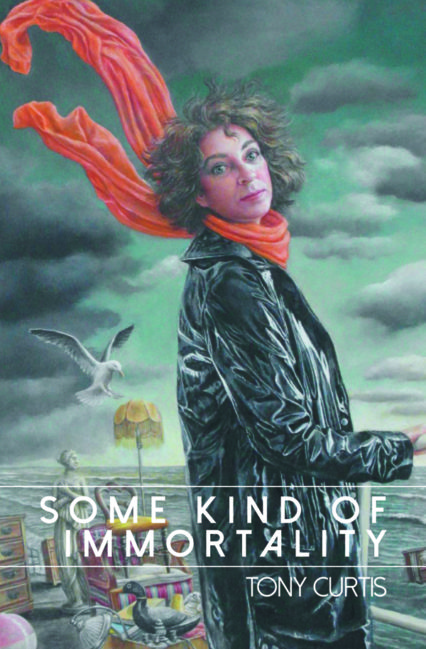Francis Spurrier reviews Some Kind of Immortality by Tony Curtis, a collection of gritty short stories, some of which stand alone better than within the book.
These twenty two stories were published individually between 1980 and 2017. The title Some Kind of Immortality is taken from the most recently published story about a sperm donor:
I missed Alex because I was in a meeting in York, but was there for Rachel, though what use I was I still don’t know. There’s been university research in London arguing that the mother would rather have another woman – sister or friend – than her man. I’d be difficult to explain away, wouldn’t I? (‘Some Kind of Immortality’)
It’s a gritty book about gritty lives: Curtis’ prose is intense and relentless with free and exuberant use of the ‘em’ dash which makes some of the pages appear quite spotty. The writing would benefit a few ‘dead’ lines, some weather, some cloud formations, or descriptions of the fabulous Pembrokeshire scenery.
 While it is easy to see the attraction of individual stories which are readable and maintain the interest, a collection calls for relationships and connections and even, dare I say, a bit of gender balance? Out of Curtis’ 22 stories there are four in which the main protagonist is a woman. The connections in these stories are to do with jealousies, suffering, grief. There is, however, thankfully, the odd laugh thrown in for good measure. Where there is life there will be the irony of life.
While it is easy to see the attraction of individual stories which are readable and maintain the interest, a collection calls for relationships and connections and even, dare I say, a bit of gender balance? Out of Curtis’ 22 stories there are four in which the main protagonist is a woman. The connections in these stories are to do with jealousies, suffering, grief. There is, however, thankfully, the odd laugh thrown in for good measure. Where there is life there will be the irony of life.
But aside from these broad connections there are, regrettably, a few clashes in Some Kind of Immortality. Uses of language that may pass as interesting or unusual in single and separately published pieces, become repetitive and start to irritate when stories are set together. For example, Aunt Josephine is described as ‘gnarled and witch-like’ (Umbrella). Auntie Lizzie smells of dust and seems to spend a lot of time killing rats and snakes (A Visit to Lizzie) and oh look! here’s Aunt Annie with ‘wart charming powers and other witch-like behaviour’ (HMS Cassandra). We get the drift.
None of the characters in Some Kind of Immortality is particularly objectionable yet none is particularly sympathetic either. The stories are peopled with men and women who seem to be tossed about by their fates and to be living their lives prone to every animalistic instinct that overtakes them; from adolescent homosexuality to sperm donation to attempted murder on the golf course. It might be argued that life is like that and this is realism. But as the poet said, human kind cannot bear very much reality. The collection lacks the possibilities of life.
There are also a few issues with Curtis’ construction. In ‘Canada Dry’ four characters are introduced in the first three lines by their first names. I spent a certain amount of time trying to work out who was who. Later on there are other confusing references to names:
‘Whistler was one of those Bevin boys. Only he wasn’t called Whistler from the start. His name was Richards, I think …’ . (‘Throwing the Punch’)
This is fine in the context of a longer work but in a short story the naming issues hinder the flow of reading. Again in this same piece, a character referred to by the narrator as ‘McIntosh’ all the way through at a crucial point at the end is termed ‘Jock’ which then sent me back to check whether ‘Jock’ was the same as ‘McIntosh’ or someone else.
We all like to think that when push comes to shove we will do the right thing, but how many of us do? The story ‘Terminates at Newport’ deals poignantly with this issue.
‘When you have a gut feeling and did not act, when you could have made a difference but miss the chance, things move on but the moment doesn’t return, does it?’ (‘Terminates at Newport’)
In this piece a man witnesses something on a train, suspects that it was a rape but convinces himself that the woman was drunk, that she might be a hooker (the tragedy being less whether the man could or should have done something but that society sees a woman being drunk and/or a hooker as mitigation for rape).
This story contains the best line in the book as the protagonist imagines that in another time and another place he would act differently. Next time, he thinks, he will offer to help explain that he was a doctor, although:
‘His was a Ph.D in polymer instability at extreme temperatures from Bath’.
But no-one helps. The police are called and the train which had been bound for Swansea is terminated at Newport.
‘But we always stop at Newport for those unfortunate enough to live in the place,’ said Jane.
Well Jane, I am here to tell you it is possible to survive living in Newport. It is even possible to survive being born and bred in the place.
You can buy Some Kind of Immortality by Tony Curtis now from Cinnamon Press.










